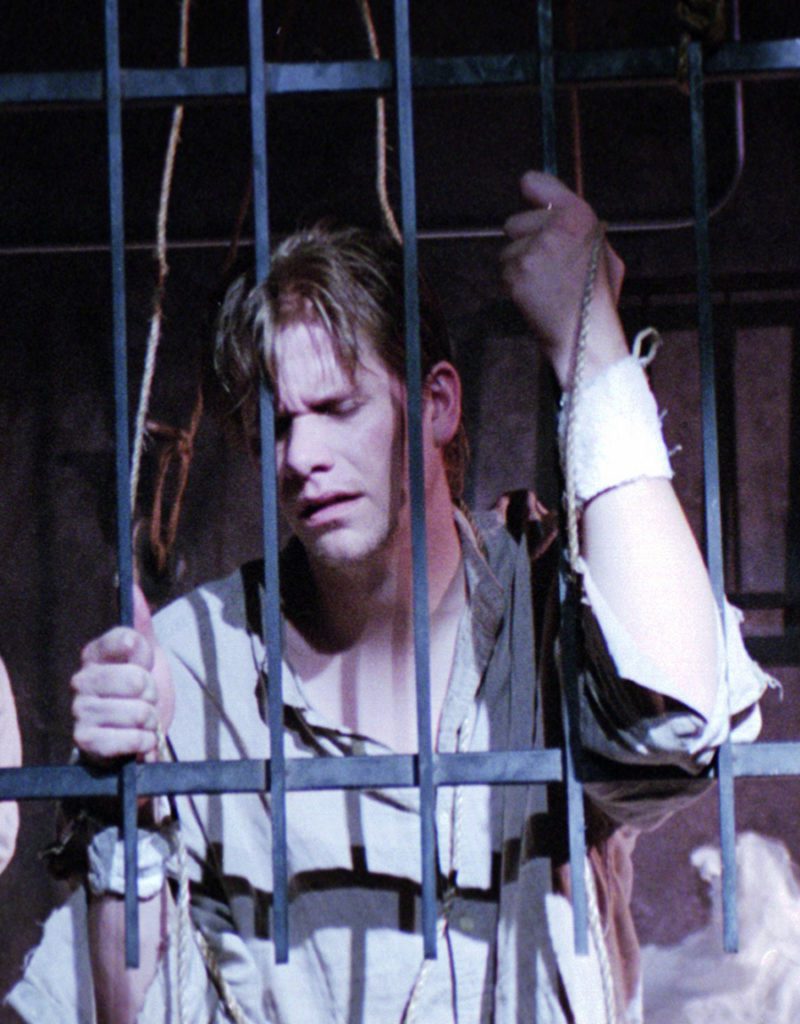“When he talks you recognize in him the lunatic and the man.” -Anton Pavlovich Chechov, Ward #6
In 1892, Anton Chekhov’s fictional narrative, Ward #6, cracked open the relationship between a doctor and an asylum patient in a dysfunctional hospital in 19th-century, provincial Russia. This year, three years after its birth as a company, the Buntport Theater Company has brought Chekhov’s work to life in a clever adaptation of the story for the stage.
From the moment that the production begins in total darkness, two things in particular stand out in this adaptation. The first is that the company (wisely) decides to stay close to the original text of the narrative, creatively using passages and dialogue as the basis for their script. The second is that the adaptation is forged from a collaborative process. The casting has virtually nothing to do with age or gender; rather, it relies on the sheer skill of the four actors to deliver a rotating cast of characters with no help from essentially uniform costuming. The cast tries on characters like clothes, and like clothes some of the characters are better worn by a particular actor. It is an experiment that allows the audience a glimpse into the process, and it’s one of the features of Ward #6 which keeps it vital. However, by the end of the production, I had hoped to see the cast settle into the parts which they play particularly well, most notably actress Erin Rollman as Ivan Dmitritch, the passionate and tortured patient who captures the interest of his disassociated doctor, Andrey Yefimitch. Instead, the musical chairs of character swapping continues throughout the production-understandably in some cases since ten characters are played by four actors/actresses-which is something of a distraction in the otherwise gripping conclusion.
The staging and set of Ward #6 are beautifully done in their simplicity and surprising functionality. Resembling a suspended shipwreck, every prop, from chairs to plaster casts of partial human forms, hangs on a system of pulleys above a stage of ascending pallets, planks and grates. The cast never leaves the stage, but uses effective, though not technically superior, lighting, and tremendous body language to indicate their stage presence. The set, staging and the unusual casting of Ward #6 work compellingly toward the single goal of slowly undressing Chekhov’s narrative to reveal its tragic and moving themes.
The crux of the story rests in the juxtaposition between Ivan, the intelligent, compassionate and mad patient, and Andrey, his detached and listless doctor. Andrey believes in suffering, dismissing its gravity in favor of a longing for an intellectualism, casually saying to his tortured patient: “Pain is a vivid idea of pain.” Andrey seeks, more than anything, a brotherhood of the intellect, which he ironically finds in Ivan. Ivan finds himself into the madhouse through an overactive intellect, a paranoia of the mind that leads him to fear uncontrollably for the loss of his “freedom and honor.” He is a man who passionately loves the world but is trapped in his own mind, and Andrey is a man who lives in the world and longs to inhabit the intellect. One of the highlights of the production comes with the formation of a brotherhood between the two men-the very brotherhood that Andrey seeks. It appears as a slice of continuity marked by a clarity and vibrancy of the intellectual tete-à-tete between these two men in the otherwise jarring and discontinuous world of Ward #6. The short sequence of scenes drips with delicious irony and complex emotional and intellectual contention, and the production would have benefited by prolonging it, both in their development and eventual deconstruction.
The world you step into when you visit Buntport’s adaptation of Ward #6 absorbs you instantly. In the intimate setting, its figures and faces communicate the subtlest of humor in an otherwise bleak world. They entreat you to look on the interior suffering of man, and they do so for the most part successfully. Only a few wearisome moments live in this production, and despite some of the awkwardness caused by a few of its transitions, Ward #6 sets its standards high, and lives up to them in a poignantly entertaining stage drama.
-Loren Drummond, August 16, 2001, The Boulder Weekly
